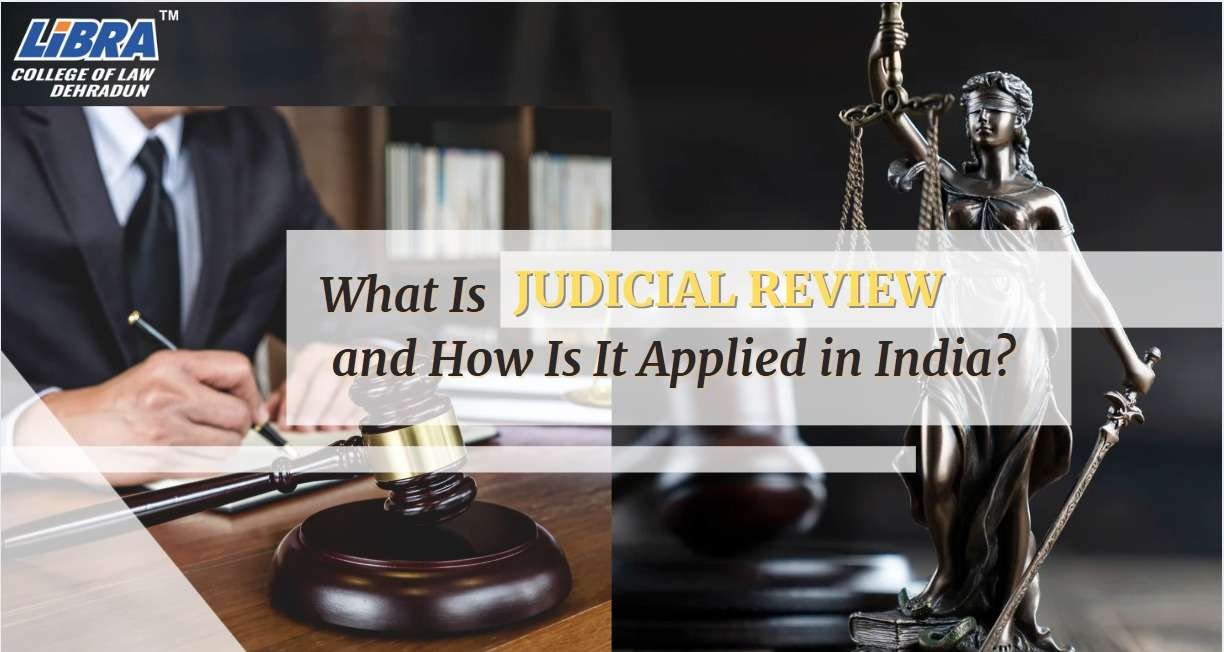What Is Judicial Review And How Is It Applied In India?
To Libra College of law

Have you heard about judicial review? Well, judicial review works as a safeguard of fundamental rights, maintaining the dignity of the constitution, ensuring the balance of power, and many more. In this blog, we will discuss what judicial review is, its types, scope, importance, benefits, and more. So let’s discuss the Judicial Review in India and everything related to it. Keep reading to know further.
What Is Judicial Review?
The judicial review stands for the power of the judiciary that is responsible for examining the rules regulated by the legislative assembly and executive orders. It is for both the central and state governments. For any violation, the judiciary considers it illegal, invalid, and unconstitutional and neglects to enforce.
What Are The Types Of Judicial Review?
The judicial review stands for the power of the judiciary that is responsible for examining the rules regulated by the legislative assembly and executive orders. It is for both the central and state governments. For any violation, the judiciary considers it illegal, invalid, and unconstitutional and neglects to enforce.
What Are The Types Of Judicial Review?
The judicial review is of various types, and it all depends on the scope and nature of the review. Have a look at the different types of it.
Statutory Judicial Review
When we talk about this type of judicial review then it is all about the assessment and validation of the statutes the regulations. This makes sure that all the laws are applied properly and maintains a proper consistency with other legal provisions.
Substantive Judicial Review
In this, the courts are highly responsible for checking and analyzing the laws and decisions in order to check whether they are fair, adhere to the principle of justice, and are reasonable or not.
Administrative Judicial Review
This includes a fair review of the actions and decisions from the end of the courts. It ensures the correctness in procedure, statutory mandates, and reasonability of the decisions from the agencies’ end.
Constitutional Judicial Review
This includes the fair examination of the legislative work, executive orders, and the decisions of the administration. The judiciary makes sure that these align with the constitution or not.
Procedural Judicial Review
It checks whether the legal process or procedure was kept in mind while making the decision. It ensures whether the due processes and fair trial principles are maintained.
What Are The Scopes Of The Judicial Review?
We understand how judicial review is important for the indian constitution. It empowers the judiciary to ensure fairness in the legislative and executive actions that will gradually bring the balance of power. Here are some of the scopes of judicial review that are mentioned below.
Legislation
The courts have the power to diminish or neglect the laws and rules that stand against the fair principles of the constitution, especially those that violate fundamental rights.
Executive Decisions
All the administrative actions must adhere to legality, reasonability, and natural justice principles.
Constitutional Amendments
By way of the Basic structure doctrine established in KeshavanandaBharati v. State of Kerala (1973), the court has the power to oppose the amendments that disrupt the fundamental framework of the Constitution.
What Is The Importance Of Judicial Review In India?
The doctrine of judicial review has various kinds of benefits that you should not overlook. Here are some of them mentioned below. Whether you are a citizen of the country or a part of the judicial system, you must know about it very well.
- It safeguards the fundamental rights of the citizens.
- It helps in balancing the federal equilibrium, that is balance between the centre and the states.
- It maintains the supremacy of the constitution in a positive way.
What Are The Benefits Of The Judicial Review?
There are a number of benefits of the judicial review that are mentioned below. Have a look at them one by one.
- It ensures that no one misuses the power, neither legislative or executive. This way, the balance of power among all the bodies can be maintained.
- It helps in reinforcing the principle that the constitution is the supreme and also makes sure that all the rules and regulations adhere to the principle of the constitution.
- It ensures that the rights of the minorities, vulnerable and weak sections must not be oppressed in any how. This helps the individual to live by a standard in society.
How Is Judicial Review Applied In India?
When it comes to how judicial review is applied in India then the ways are very simple. It does so by checking whether the legislative and executive acts adhere to the constitution or not. Along with this, it can also neglect the laws that violate fundamental rights, administrative decisions, disturb the procedure, and many more. This is how judicial review is applied in India to make sure every act within the law and the constitution works properly.
Sum Up!
Here we have reached the end of what judicial review is and how it is applied. We have discussed everything related to it that will give an idea of how things work. If you have any confusion related to the same, then you can go through this blog and clear your doubts. At Libra College Of Law, the experienced faculty teach the students about the same and make the students ready for the real world challenges of indian law and constitution. If you have an interest in the same, then you can enroll here and fulfill your dream of doing great in the field of law and order.

